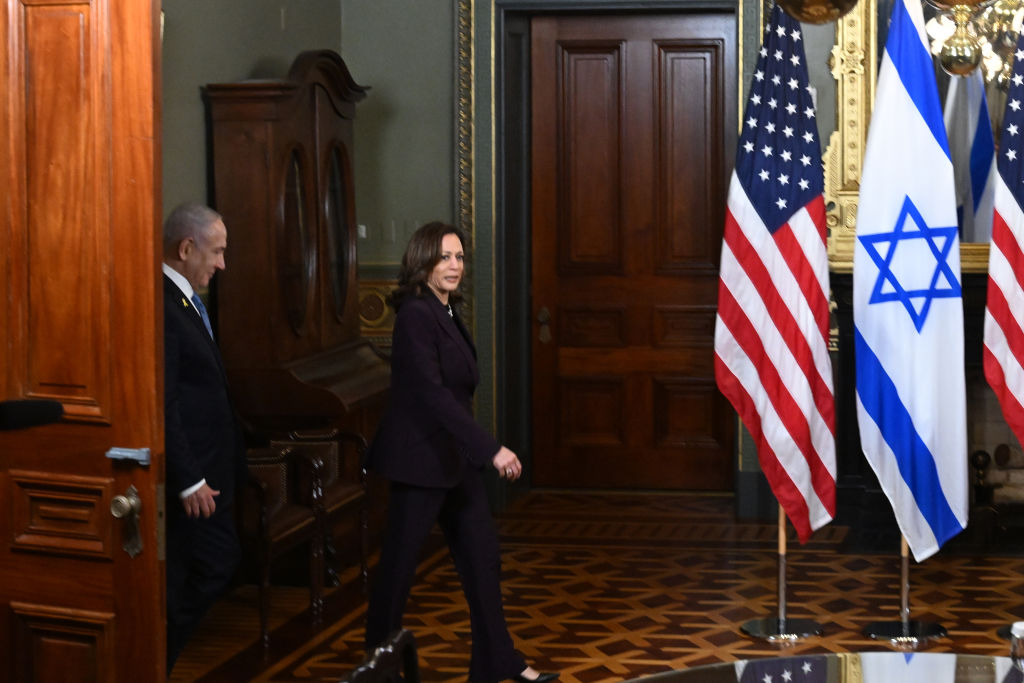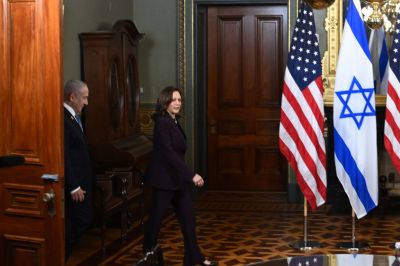With Election Day less than one month away, a tight American presidential race is now introducing an added layer of uncertainty to an already unsettled Middle East. As Israel mulls its planned retaliation for Iran’s October 1 ballistic missile attack—and continues the fight against Iranian proxies Hamas in Gaza and Hezbollah in Lebanon—the question of who will occupy the Oval Office next year raises concerns about the U.S. role in a moment of regional instability.
In general, the Israeli public—and in particular supporters of Prime Minister Benjamin Netanyahu—see former President Donald Trump as a preferable option. Although President Joe Biden generated goodwill through his outspoken support for the embattled U.S. ally after October 7, it’s unclear whether that popularity extends to Kamala Harris, who as vice president has taken a more critical stance toward Israel’s war effort than her boss.
For many Israelis, Harris’ public statements over the last year have raised questions about whether she fully appreciates the complex threats facing their country today.
The vice president has been consistently supportive of Israel’s right to defend itself, but she has also criticized Israel’s prosecution of the war as she seeks to walk the line between pro-Israel establishment Democrats and her party’s far-left flank, which not only opposes Israel’s war effort but increasingly also rejects the country’s right to exist. Harris also lacks Biden’s long-standing record as a staunch ally of the Jewish state.
“With Biden, there was at least a sense that emotionally, he is on the side of Israel and was very committed in many ways to Israel throughout the war, whatever his concrete policies were,” said Uriel Abulof, a political scientist at Tel Aviv University. “With Kamala Harris, it’s less definitive. And so even though there is an expectation that her policies would roughly align with those of Biden, lacking that emotional core is somewhat problematic.”
Many of Harris’ grievances against Israel have been directed at Netanyahu and his governing coalition. In July, Harris skipped the prime minister’s address to Congress in what some Israeli officials described as a “boycott.” Following his visit, she declared she would “not be silent” on suffering in Gaza and reiterated her call for Netanyahu to reach a ceasefire with Hamas.
Harris hinted at the complicated relationship again in an interview with CBS News’ 60 Minutes that aired last week. Asked whether the U.S. has a “real close ally” in Netanyahu, Harris responded: “I think, with all due respect, the better question is, ‘Do we have an important alliance between the American people and the Israeli people?’ And the answer to that question is yes.”
Like Biden, Harris has incurred the wrath of the far left for the administration’s support for Israel. The Democratic nominee made headlines when she sparred with anti-Israel hecklers at a Detroit rally in August. “You know what? If you want Donald Trump to win, then say that. Otherwise, I’m speaking,” she told them. Protesters attempted to confront the vice president again this month, as she delivered remarks during a tree-planting ceremony memorializing the victims of Hamas’ October 7 massacre.
Divides between Israeli and American leadership have deepened over the last year of fighting in Gaza, particularly as the Biden administration publicly and privately pushes Jerusalem to reach a diplomatic solution it’s unclear that Hamas wants. In Lebanon, Israel is operating against Hezbollah on the ground after a series of strikes to degrade its arsenal and leadership, including the killing of the group’s leader, Hassan Nasrallah, in September.
Nadav Eyal“What has happened in the recent 15 or 20 years is that the Israeli public has become much more involved in American politics.”
Heightening this moment of anxiety for many Israelis is the looming prospect of a nuclear-armed Iran, an existential issue that the next American president will almost inevitably need to confront.
While administration officials including Harris have vowed never to let Iran obtain a nuclear weapon, they remain reticent on the prospect of military action to prevent it. As Israel prepares to respond to Iran’s ballistic missile attack, for example, Biden has publicly signaled his opposition to Israeli strikes against Iran’s oil facilities or nuclear sites. In contrast, former President Donald Trump urged Israel to “hit the nuclear first, and worry about the rest later.”
To many Israeli officials, the disparate responses to the unfolding crisis feel emblematic of how the Democratic and Republican presidential candidates may handle the region more generally. While Trump’s unpredictability is a cause for concern, so too are the Biden-Harris team’s calls for Israeli restraint in the face of real and pressing dangers.
“If you speak with decision makers, it’s sort of a mixed message. Basically they would say that on the one hand, Harris is much more predictable than President Trump and they understand the logic, the rationale there,” said Nadav Eyal, a prominent Israeli political commentator and journalist. On the other hand, Israelis are “very unhappy with the Biden administration’s policy in the region.”
Both members of the governing coalition and opposition parties “feel that the Biden administration doesn’t have a policy vis-à-vis Iran in the region—countering Iran, deterring Iran. They didn’t develop a coherent approach in trying to restrain bad actors in the region,” Eyal added. “What did the U.S. try to do? It tried to prevent a regional war, and to say to different actors, ‘don’t.’ Well, they did.”
From the outset of Biden’s term, the administration’s Middle East policy has centered largely on reviving diplomacy with Iran rather than confronting its destabilizing activities in the region.
Efforts to restore the Obama-era Iran nuclear deal—a 2015 agreement that limited the Islamic Republic’s uranium enrichment in exchange for sanctions relief, from which the Trump administration withdrew in 2018—began in April 2021 but failed after multiple rounds of indirect talks. Critics argue the diplomatic overtures, which saw the loosening of U.S. sanctions and included the unfreezing of some Iranian assets, instead gave Tehran a badly needed financial lifeline.
Israel’s political echelon fears Harris will attempt to carry on what it views as the “Obama doctrine,” said Yoni Ben-Menachem, an Israel-based political analyst, of an approach that pursues diplomatic engagement rather than confrontation with Iran.
As a senator and presidential contender in the Democratic primary in 2019, Harris articulated her goal of rejoining the nuclear agreement. She also frequently accused then-President Trump of pushing the U.S. toward a military confrontation with Iran, and co-sponsored in 2020 legislation known as the No War Against Iran Act, which would’ve prevented funding for the use of force against the Islamic Republic.
But the Iranian-fueled war in the Middle East seems to have hardened the Biden-Harris team’s approach. In addition to calling for a ceasefire in Gaza, the 2024 Democratic Party platform accused Trump of not adopting a forceful enough strategy to counter Iran while in office. Asked in her 60 Minutes appearance whom she considers America’s greatest adversary, Harris didn’t hesitate: “I think there’s an obvious one in mind which is Iran. Iran has American blood on their hands.”
In the wake of Hamas’ attack on October 7, the U.S. sought to deter further Iranian involvement in its proxy’s war against Israel, including through the deployment of two carrier strike groups to the region. When that deterrence failed with Iran’s first direct assault on Israel in April, the U.S. rallied its regional allies to Jerusalem’s defense. American forces assisted in Israel’s defense again earlier this month, helping the country to intercept most of the nearly 200 ballistic missiles launched at it by Iran.
Under the Biden-Harris administration, many expect that defense coordination to continue apace. On Sunday, Pentagon officials announced plans to transfer to Israel a Terminal High-Altitude Area Defense (THAAD) battery—an anti-ballistic missile defense system—along with accompanying soldiers to man it. The move marks the first operational deployment of a U.S. missile defense system and crew on Israeli soil since the Gulf War in 1991.
But it’s unclear whether these steps do much to boost Harris’ pro-Israel bona fides. A September survey of Israelis by Langer Research Associates and Public Opinion Research Israel found that 58 percent of respondents believed that Trump would be better for Israel’s national security, compared to just 20 percent who thought the same of Harris. Support for the former president was even more pronounced among supporters of Netanyahu’s governing coalition, with 88 percent of respondents saying Trump would be better for their country’s security.
“What has happened in the recent 15 or 20 years is that the Israeli public has become much more involved in American politics,” Eyal told The Dispatch. “Because of that, you really see how the [Israeli] right wing is connecting with the American right wing. As to the center-left, it’s a much more heterogeneous position. You have people who like Trump very much, but you also have people that see themselves very much affiliated with the ideas of what Americans term as liberals.”
At least some of the general skepticism about Harris seems to stem from her efforts to appease anti-Israel Democrats in what Jerusalem’s supporters view as a false moral equivalence. Critics say she condemns Hamas in one breath and criticizes the Israeli government in the next. She bemoans the nationwide torrent of antisemitism in the wake of October 7, but only when coupled with objections to Islamophobia.
“The moment that you create that level playing field, you embolden [Iran and its proxies] with that false moral equivalence to say tit for tat. You did this, and I do that,” Michal Cotler-Wunsh, Israel’s special envoy for combating antisemitism, told The Dispatch. “That is not the way democracies and international institutions entrusted to uphold and protect foundational principles of life and liberty were supposed to, at any point, handle what we’ve seen over the last year.”
If personnel is policy, then Harris’ appointments also raise concerns among Israel and its supporters. Philip Gordon—a longtime Democratic aide and Harris’ national security adviser—has been outwardly skeptical about the limits of U.S. hard power, particularly when it comes to the Middle East. Another Harris campaign pick, Brenda Abdelall, drew backlash for her past comments accusing “Zionists” of “controlling a lot” of American politics.
Unlike Harris, Trump has a clear foreign policy record to draw on given his four years in office. And most Israelis view many aspects of that record fondly: The former president withdrew from the Iran nuclear deal, implemented crippling sanctions on the Islamic Republic, moved the U.S. Embassy in Israel to its capital Jerusalem, recognized Israeli sovereignty over the Golan Heights, and brokered a series of normalization series known as the Abraham Accords.
“His willingness to break accepted diplomatic positions is something that Israelis liked, of course because he did it in ways that were beneficial to Israel,” Chuck Freilich, Israel’s former deputy national security adviser, told The Dispatch.
But Trump today is “even less predictable than he was in his first term,” Freilich added. “He’s unbound by any real restrictions this time, because he doesn’t care about being elected again. He seems to be willing to flout all sorts of American laws and conventions, so nobody knows what he’ll do, including in regard to Israel.”
Whether a second Trump term’s Middle East policy would resemble the first remains unclear. Many high-profile national security and defense officials from his first stint in office have publicly broken with the former president. And what appears to be the GOP’s growing deference to its isolationist-leaning, national conservative contingent also threatens to derail Israel’s efforts to degrade the threats on its borders. During a meeting with Netanyahu over the summer, Trump reportedly told the Israeli premier to “get it over with fast” in reference to the war against Hamas.
“Trump is not a wartime president. His experience in that realm is not vast,” said Jonathan Schanzer, senior vice president for research at the Foundation for Defense of Democracies. “The bottom line, if we’re to be quite frank, is it’s unclear what either candidate would do upon assuming office as it relates to this war.”
This uncertainty is particularly troublesome for Israelis as Iran—which is capable of producing enough highly enriched uranium to use in a nuclear bomb within just weeks—decides whether or not to pursue weaponization.
“Iran is very, very close to the bomb,” said Freilich, now a senior researcher at the Tel Aviv-based Institute for National Security Studies. “Is the next president the person you want to see being the one who confronts that?”






Please note that we at The Dispatch hold ourselves, our work, and our commenters to a higher standard than other places on the internet. We welcome comments that foster genuine debate or discussion—including comments critical of us or our work—but responses that include ad hominem attacks on fellow Dispatch members or are intended to stoke fear and anger may be moderated.
With your membership, you only have the ability to comment on The Morning Dispatch articles. Consider upgrading to join the conversation everywhere.